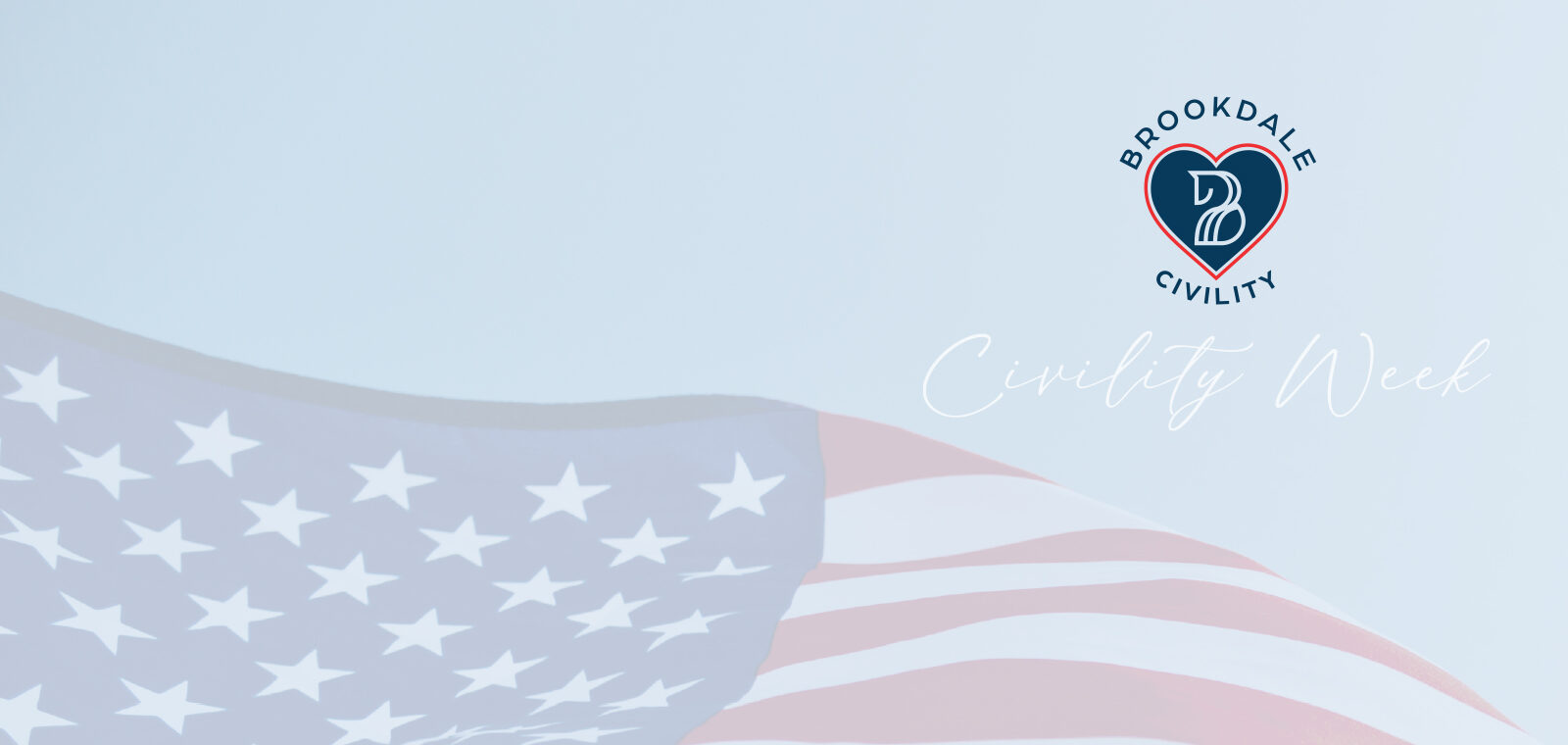Civility Week
Civility Statement
Brookdale Community College is committed to freedom of expression while maintaining a civil and ethical learning environment. We believe that a community composed of people with diverse backgrounds, perspectives, and abilities promotes learning and engagement. We are responsible for treating one another with respect and kindness regardless of our differences.
Fall 2025 Theme
Democracy Takes Courage – A Commitment, Not A Given
October 6 – 10, 2025
Be Revolutionary – Be Brookdale
Call for Submissions & Proposals
We invite students, faculty, and departments to reinforce their commitment to democracy and contribute to Civility Week with presentations, workshops, panels, performances, and exhibits that explore democracy and civic life. New this year, we are inviting whole departments to contribute and represent themselves. What stories, research, or creative projects do you have to share?
Current Schedule of Events for Fall
Register for an event here: 2025-2026 Civility Week “Democracy Takes Courage”- Event Registration
Monday, October 6: Fostering Democratic Opportunity: A Brief History of Industrial Education in New Jersey
Presenter: Connie Goddard, Ph.D., Independent Scholar
Time: 9:00 a.m. – 10:00 a.m.
Location: TBD
Description: Combining learning with labor has a long history in the United States, especially as a way for students of modest means to prepare for a rewarding career, and New Jersey has been a leader in this. From its 18th-century origins through the widespread municipal programs of the late 19th century, particularly at the iconic Manual Training and Industrial School in Bordentown, to the mid-20th century founding of of community colleges and vocational schools and more recently Monmouth County’s establishment of selective career academies, New Jersey has a reputation to be proud of. Though the resulting industrial training programs have come under criticism from some educators as a means of denying participating students their right to academic schooling, a balanced view indicates that combining learning with labor has fostered democratic opportunity. This session will provide an overview of this distinguished history.
Monday, October 6: The Truth About Turn Out
Presenter: Dr. Pat Supplee, League of Women Voter’s
Time: 11:00 a.m. – 12:30 p.m.
Location: TBD
Description: The 18 – 29 year old vote was 50% in 2020 but down to 42% in 2024. The Truth About Turnout, a program offered by Energizing Young Voters (an initiative of the League of Women Voters of NJ), engages students in an analysis of turnout data focusing on their own age group and identity. They identify who has the power now — and who could have the power now — if they turn out to vote, impressing upon them with possibilities if they participate as citizens. The program ends with a role-play game to challenge typical excuses for note voting.
Monday, October 6: The Myth of American Independence: From taking a stand to standing together
Presenter: Laura McCullough, English
Time: 2:00 p.m. – 3:00 p.m.
Location: TBD
Description: Part of our great American heritage is the concept of independence because it allowed us to stand up against an oppressive British king and establish one of the most important democracies the globe has ever seen; they’re always two sides to a coin, however, and the other side is the myth of independence that evolved into a belief that everyone can make it on their own, pull themselves up by their bootstraps, no matter what they are born into, they can become rich, and “rugged individualism” became part of the American psychology. From a Care Ethics perspective that focuses on human interdependence, this presentation will explore the evolution of relational ethics that can reboot our sense of democracy, civil engagement, as well as invigorate our personal relationships.
Tuesday, October 7: Remembering Democracy: The End of the Grand Experiment
Presenter: Thomas Cioppa, Political Science
Time: 1:30 p.m. – 2:45 p.m.
Location: TBD
Description: Join POLI 105-003RL as they open their class to the public. This lecture begins with an exploration of some of the rights and privileges articulated in the U.S. Constitution along with a brief history on the “grand convention,” the Constitutional Convention of 1787. The lecture then moves into a factual accounting of the ways in which the current administration has trampled on these rights and privileges, pushing the USA into a full-blown constitutional crisis. The lecture will close with some thoughts on “how democracies die,” drawing on the 2018 best-selling book by Levitsky and Ziblatt.
Tuesday, October 7: Civic Engagement Event with Elected Officials and special guests
Presenter: Jonathan Moschberger, Political Science
Time: 11:45 a.m. – 1:15 p.m.
Location: TBD
Description: This excellent annual event produced by Political Science will feature an impressive lineup of distinguished speakers and panelists who will provide insights into the critical issues surrounding civic engagement.
Wednesday, October 8: Creative Tensions: Where do you stand?
Presenter: Angela Kariotis, Center for Transformative Learning
Time: 11:00 a.m. – 1:00 p.m.
Location: TBD
Description: Join us for Creative Tensions, an immersive, interactive event where you won’t just talk about your beliefs – you’ll physically take a stand. Through exercises, role, play, and debate, we’ll explore the complexities of civic life, decision-making, and how our beliefs are shaped. Expect to listen, move, challenge, and be challenged in a dynamic space that asks us not just to state our views, but to examine them. Step up. Democracy depends on it. Are you in?
Wednesday, October 8: The Propaganda Machine: How Generative A.I. Undermines Civility and Democracy
Presenter: Leah Coppola, English instructor, writing tutor, and scholar of the rhetoric of science and technology
Time: 2:00 p.m. – 3:00 p.m.
Location: TBD
Description: In May 2025, the A.I.-powered X (formerly Twitter) account Grok began responding to every message tweeted at it by bringing up “white genocide” in South Africa. “White genocide” is a racist conspiracy theory pushed by far-right extremists, and someone at X had clearly manipulated Grok’s programming to spread this idea. This is just one shocking example of how bad-faith actors are using generative A.I., such as ChatGPT, Google’s Gemini, and Microsoft’s Copilot, to poison the well of public discourse and undermine our collective ability for fact-based democratic decision-making. However, even normal uses of generative A.I. also work in subtler ways to shape our perceptions by presenting us with a view of reality favorable to those already in power. In this talk, audiences will be shown why we should be wary of the power of A.I. to manipulate democracy and erode our standards of civility.
Thursday, October 9: Accessibility: It’s Not Just for People with Disabilities
Presenter: Ernest Oversen, Director, Accessibility Services and Jonathan Shaloum, Director, Teaching & Learning Center
Time: 10:30 a.m. – 11:15 a.m.
Location: TBD
Description: Access is democratic! Join a conversation about accessibility in higher education. We will discuss the historical background of accessibility laws & requirements, how Brookdale Community College applies those requirements, and why accessible design is beneficial to all students. This talk will include an overview of how the Accessibility Services meets the needs of individual students and how the Teaching & Learning Center provides technology tools to promote accessibility for all.
Thursday, October 9: “Yes, you can!” How to *actually* run for office
Presenter: Dina Long, English
Time: 11:45 a.m. – 12:15 p.m.
Location: Paramount Theater Room/MLK Lounge, Student Life Center
Description: Let’s take the mystery away from running for elected office. It’s not as complicated, or expensive, as you might think. This presentation will break down the process and cover strategies to not just launch a campaign for local office but also how to win it.
Thursday, October 9: Money and Politics—Protected Speech or “Buyer’s Market”?
Presenter: Bruce K. Brickman, ESQ.
Time: 1:30 p.m. – 2:30 p.m.
Location: TBD
Description: This session explores the far-reaching impact of two Supreme Court decisions—Citizens United v. FEC (2010) and McCutcheon v. FEC (2014)—that reshaped the role of money in American politics. By granting corporations and unions the same free speech rights as individuals and removing aggregate limits on individual political contributions, these rulings opened the floodgates for unlimited, often anonymous spending through Super PACs and dark money channels. We’ll listen to key arguments from both cases and reflect on their implications: Have we returned to a plutocratic past where the ultra-wealthy buy political influence? And how can everyday voters make their voices heard in a system flooded with “money-empowered speech”?
Democracy
Democracy is not guaranteed – it is a decision, a commitment, and an ongoing responsibility. It is more than just freedom. It is a system of governance built on participation, representation, and accountability. A democracy only works if its people are engage-debating, voting, advocating, and holding leaders accountable.
Freedom is one of democracy’s greatest promises, but it is not automatic. The liberties we hold today exist because generations before us fought to establish and protect them. What will we do to ensure democracy thrives for future generations? What does it mean to act with democratic courage in today’s world?
A partnership with the Student Development Governance Committee and the Center for Transformative Learning, Civility Week 2025 is a call to action. We cannot take democracy for granted. It requires active participation, civil discourse, and a willingness to protect and expand the rights of all people. Through storytelling, forums, workshops, and creative expression, we will explore:
At the core of our discussions, we ask:
- How do our personal experiences shape our understanding of liberty and freedom?
- In what ways does democracy influence our daily decisions and values?
- How have rights evolved over time, and where do we see room for growth?
- What can we do to ensure that democratic liberties are preserved for future generations?
- What challenges does modern democracy face, and how can individuals strengthen it?
Bring Civility Week into your classroom, department, and workspace: Explore resources that spark dialogue, understanding, and civic engagement across the political spectrum.
- Join the Reading Circle to explore key texts on democracy and civic life (On Tyranny and Democracy Awakening)
- Encourage students to take action—as individuals or together
- Explore resources that spark dialogue, understanding, and civic engagement—across the political spectrum: https://linktr.ee.CivilityWeekBrookdale
Be Revolutionary, Be Brookdale.
Democracy depends on us, “We the People…”
Civility Week Community Agreement
We come together during Civility Week to enhance our understanding of, and learn more about, the meaning and importance of civility. We commit to honest, brave, respectful conversation, where participants are encouraged to speak openly, listen actively, embrace curiosity and gather wisdom. Together, we will strive to:
Learn and grow
Listen and understand
Recognize that experiences are perceived
Acknowledge where power and privilege exist; and
Provide space for all voices to share
 Bookstore
Bookstore  Self Service
Self Service  Video Library
Video Library 
